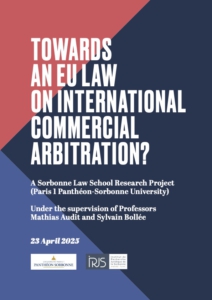Views
According to the French Cour de Cassation, the law applicable to the sub-purchaser’s direct action against the original seller depends on who brings the claim!
Written by Héloise Meur, Université Paris 8
In two rulings dated 28 May 2025, the French Cour de cassation (Supreme Court) ruled on the issue of the law applicable to a sub-purchaser’s direct action in a chain of contracts transferring ownership, under European private international law. The issue is sensitive. The contractual classification under French law —an outlier in comparative law— had not been upheld by the Court of Justice of the European Union (CJEU) to determine international jurisdiction under the Brussels system (CJEU, 17 June 1992, C-26/91, Jakob Handte). Despite CJEU’s position, the Cour de cassation had consistently refused to adopt a tort-based qualification to determine the applicable law (esp. Civ. 1st, 18 dec. 1990, n° 89-12.177 ; 10 oct. 1995, n° 93-17.359 ; 6 feb. 1996, n° 94-11.143 ; Civ. 3rd, 16 janv. 2019, n° 11-13.509. See also, Civ. 1st, 16 jan. 2019, n° 17-21.477), until these two rulings rendered under the Rome II Regulation.
“Towards an EU Law on International Commercial Arbitration?” A Sorbonne Law School Research Project

Written by Dr. Nima Nasrollahi-Shahri (Sorbonne Law School) and Vincent Bassani-Winckler (PhD Candidate, Sorbonne Law School), both authors participated in the Working Group.
A few days ago, the Sorbonne Law School released the final report of a collective research project chaired by Professors Mathias Audit and Sylvain Bollée, entitled “Towards an EU Law on International Commercial Arbitration?”.
Conducted within the IRJS (Institut de Recherche Juridique de la Sorbonne), and more specifically its research group on private international law, SERPI (Sorbonne – Étude des Relations Privées Internationales), this project sets out to examine whether and how to improve the relationship between commercial arbitration and EU law.
Civil Personal Status Law in the UAE and the Paradox of the Application of Foreign Law: A Legal Trap?

I. Introduction (*)
(*) For the sake of simplicity, reference will be made only to Federal Decree-Law No. 41/2022 of 2 October 2022 on Civil Personal Status. The Emirate of Abu Dhabi has enacted a separate law that addresses similar matters at the local level. For a comparison of the various applicable legal frameworks in family law in the UAE, see Béligh Elbalti, “The Personal Status Regimes in the UAE — What’s New and What Are the Implications for Private International Law? A Brief Critical Appraisal”.
There is no doubt that the introduction of the Civil Personal Status Law (CPSL) in the United Arab Emirates marks a significant turning point in the region’s legal landscape, particularly in areas traditionally governed by religious norms. The CPSL refers to the special law adopted at the federal level, which allows family law disputes involving non-Muslims (both foreigners and UAE citizens) to be resolved under a legal framework, that is intended to be modern, flexible, based on “rules of justice and fairness” and “the best international practices from comparative legal systems” (cf. article 19 of the Cabinet Resolution Concerning the Executive Regulation of Federal Decree-Law on the Civil Personal Status). However, the incorporation of the CPSL into the existing legal frameworks in the UAE has raised several issues. These include, among others, the articulation of the CPSL with the other applicable legal frameworks, and more importantly, the extent to which parties may opt out of this “modern” regime in favor of applying their own national laws (for a general overview, see Elbalti, op. cit.). Read more
News
Esplugues on New Dimensions in the Application of Foreign Law by Courts (and Arbitrators) and Non-Judicial Authorities

 The issue of “foreign law” and its application, long considered essential to the functioning of private international law (PIL), continues to trigger interesting discussions and debates. Read more
The issue of “foreign law” and its application, long considered essential to the functioning of private international law (PIL), continues to trigger interesting discussions and debates. Read more
The Procedural Law Unit at the University of Nicosia’s 5th Annual Symposium and JIWP 2025 Conference: “Judicial Independence and Liberal Democracy Under Threat: The Challenge of Implementing the ELI Mt Scopus Standards on Judicial Independence”
A symposium on “Judicial Independence and Liberal Democracy Under Threat: The Challenge of Implementing the ELI Mt Scopus Standards on Judicial Independence” will take place from 10 to 12 December 2025 at the University of Nicosia. The event is organised by the Procedural Law Unit in cooperation with the International Association of Judicial Independence and World Peace (JIWP) and will be held at the UNESCO Amphitheatre.

Registration Open – Book Launch: The Hague Convention on Choice of Court Agreements: A Commentary
 Registration is open for the book launch celebrating the publication of The Hague Convention on Choice of Court Agreements: A Commentary, to be held in hybrid format in The Hague on 11 December 2025 from 1.30 p.m. to 4.45 p.m. (CET). The book launch will coincide with the tenth anniversary of the entry into force of the 2005 Choice of Court Convention.
Registration is open for the book launch celebrating the publication of The Hague Convention on Choice of Court Agreements: A Commentary, to be held in hybrid format in The Hague on 11 December 2025 from 1.30 p.m. to 4.45 p.m. (CET). The book launch will coincide with the tenth anniversary of the entry into force of the 2005 Choice of Court Convention.
The book launch will consist of two session. In the first session, the authors and discussants will explore selected chapters of the book. Brooke Marshall (University of Oxford) and Stephanie Francq (Catholic University of Louvain) will discuss the manifest injustice and public policy exception in Article 6 of the Convention; Louise Ellen Teitz (Roger Williams University) and Fausto Pocar (University of Milan) will discuss declarations under Articles 21 and 22 and accommodating multiple legal systems; and Gilles Cuniberti (University of Luxembourg, EAPIL) and Adrian Briggs KC (University of Oxford) will discuss the law applicable to the issue of consent to choice of court agreements. The second session of the event will discuss the practical operation of the Convention and the practical application of the text, with the participation of Delphia Lim (Ministry of Law of Singapore), Colin Seouw (Colin Seouw Chambers LLC), and Anselmo Reyes (Singapore International Commercial Court). Dr Christophe Bernasconi (HCCH) will provide opening remarks, and Melissa Ford and Dr Ning Zhao (HCCH) will moderate the discussions.
For more information, and to register, please visit: https://www.hcch.net/en/instruments/conventions/specialised-sections/choice-of-court/hcch-book-launch
This post is published by the Permanent Bureau of the Hague Conference of Private International Law (HCCH).



